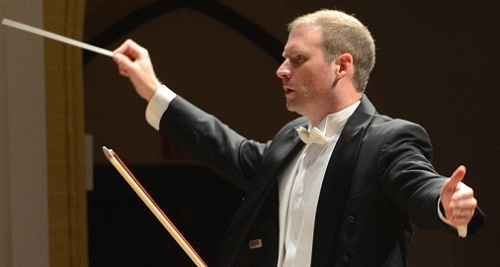Boston Cecilia contemplates war and peace in somber opener
Far from easing into a new season with a new music director, the Boston Cecilia chorus greeted its first audience of 2018-2019 with a solemn and demanding set of seven works united by one not entirely comforting idea: peace as a product of ruin — a kind of spent retreat from the unavoidable toll of our tendency toward violence and war.
The theme, and the intense but understated performances at All Saints Parish in Brookline on Sunday afternoon, made for a timely and promising start to the tenure of newcomer George Case.
Entitled “Armistice: The Journey for Peace,” Boston Cecilia’s concert spanned the Renaissance and Baroque eras as well as composers of the 20th and 21st centuries, with poems of Walt Whitman serving as a through line for some of the contemporary works.
First up was William Schuman’s dissonant 1959 setting of Whitman’s Carols of Death, which begins each of its three movements with unison voices that gradually diverge into chromaticism and tight, dense chords. The chorus took a restrained approach to this jarring music, letting the syncopated repetition of the opening canon of “The Unknown Region” speak for itself, rather than leaning into the notes. Between the composer’s direct word setting and Case’s subtle pacing, the piece became an austere rather than overtly disturbing confrontation with death.
Despite the wide historical and stylistic gap, Henry Purcell’s 1682 anthem Hear My Prayer, O Lord contains enough harmonic tension to form a bridge with Schuman’s Carols. Cecilia once again implied rather than stressed the intensity, though this time the sheer power of the 54-person ensemble was more pronounced in these implorations from Psalm 102.
A comparatively sunny setting of Psalm 122, O Pray For The Peace Of Jerusalem by Welsh-born composer Thomas Tomkins, made for the lightest moment in the concert, with bright sopranos emphasizing melody over counterpoint. By contrast, William Byrd’s 1589 motet Bow Thine Ear, O Lord, with its message of letting go of anger, may have been a reference to the wishes of Byrd and his fellow oppressed Catholics in England. Case’s direction added gentle momentum to Byrd’s sighing lines and the chorus’s expression of shock at the sight of ruined holy sites.
Herbert Howells’s 1932 Requiem proved to be the emotional as well as literal center of the concert. Mixing traditional Latin texts with English translations of Biblical passages, it offers a gradual arch from despair to peace, or at least acceptance, through seamless voicings that quickly but calmly move between both sentiments.
The Requiem was an ideal piece for the atmosphere cultivated by Boston Cecilia. From the start, the chorus achieved a firm, transparent blend with a solid foundation and inner voices. The lyrics “save us” and “we humbly beseech you” in the first movement Salvator Mundi came across as sincere exhortations earned through faith. Three pairs of soloists added an intimate, natural expression of faith in God for Psalm 23, followed by a beaming Requiem Aeternam that acknowledged loss while hoping for something better. The second Requiem Aeternam movement featured floating wordless vocals above the text, a sense of personal harmony trying to break through emotional discord. Cecilia ended the concluding “I Heard A Voice From Heaven” as much on a question as a whisper.
Following the lengthy, emotionally shifting Requiem after intermission, contemporary composer Jeffrey Van’s 2016 Fourteen Angels was concise in form as well as content. Its soft, folkish guitar accompaniment, ethereal textures and undulating theme describe a group of saints protecting children. Guest guitarist Daniel Mahoney’s near-rubato phrases and inflections added drama to Van’s lulling prayer, soothed by Cecilia’s warm cushion of sound.
It was a bittersweet moment before Van’s A Procession Winding Around Me. Letting the afternoon come full circle with another setting of Whitman’s poetry, Van composed Procession in 1991 after visiting Gettysburg and finding an “immeasurable, palpable sadness” in the empty battleground. Mahoney’s guitar depicted drums, marching soldiers and the fury of battle. Haunting soprano harmonies over descriptions of empty cities, downright terrifying evocations of shaking trestles and the male choir grimly contemplating their dead adversary ended the program on a note of peace, but not catharsis.
It was an apt last expression of what the program described as “the power of peace brought about by and through the inevitability of conflict in the world,” with ceasefires called once both sides are simply exhausted or there is no longer anything left to fight over.
Boston Cecilia’s season continues with a pair of Christmas concerts Nov. 30 and Dec. 2. bostoncecilia.org
Posted in Performances





